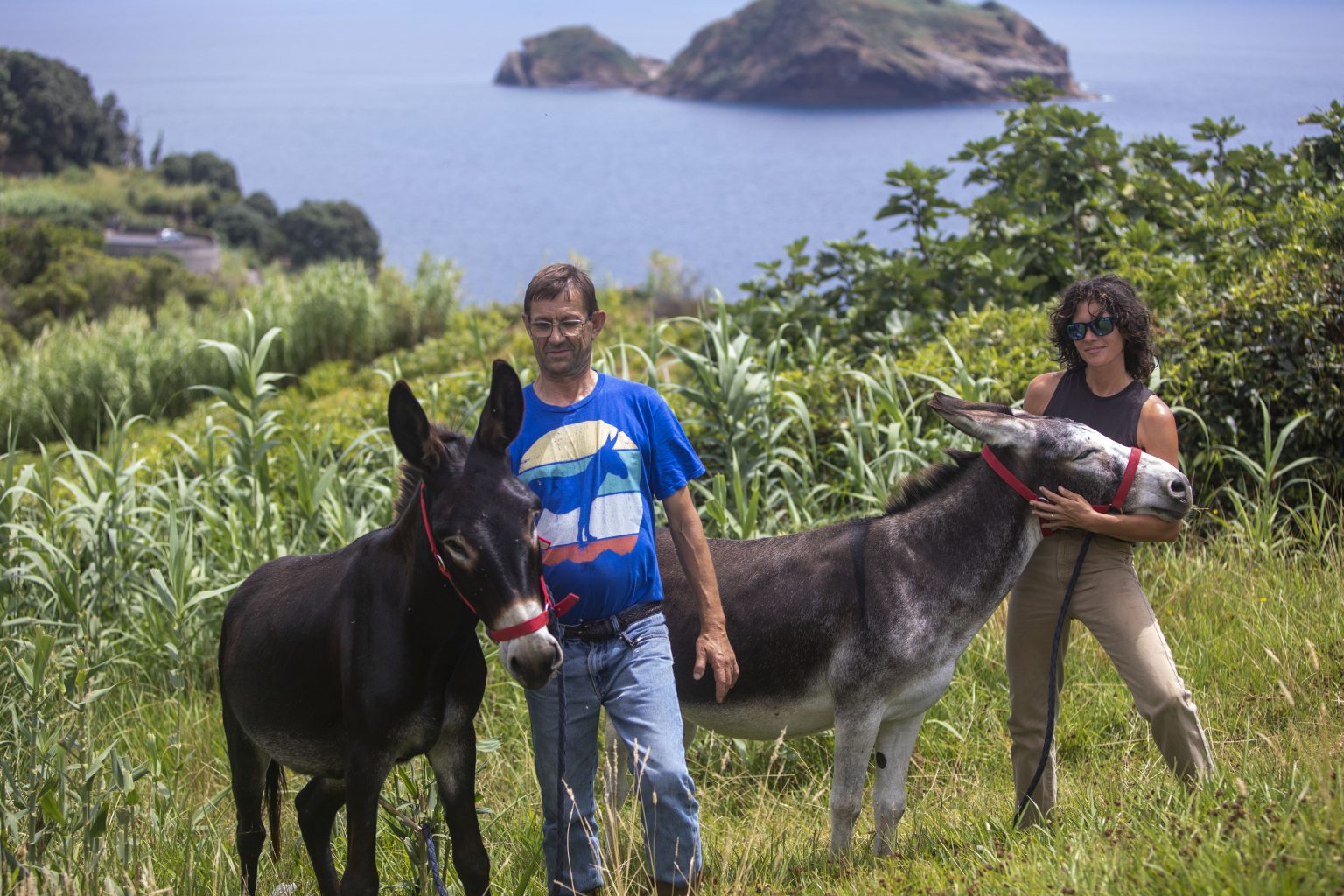American zoologist Bethany Joy could have settled in any space of the globe, but after ‘touching’ the Azores four times sailing, she decided she had to “live in paradise,” and nowadays, she promotes donkey rides for tourists.
Originally from Missouri, Bethany Joy spent 15 years sailing the globe working on animal conservation projects and crossing the Atlantic many times. She has stopped in the Azores on four occasions, and “every time,” she generated the “mental note that she would return and live in paradise” in the Azores, at the island of São Miguel.
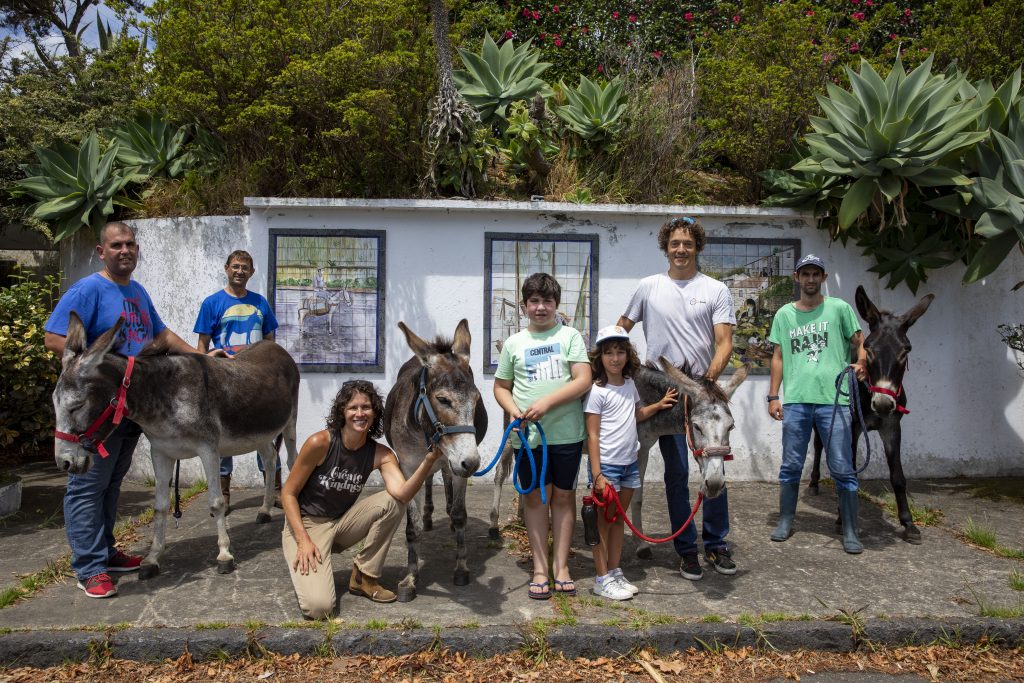
The intention came true after her marriage to an Italian. They both settled in the Azores, says the zoologist in declarations to Lusa, under the shade of the trees, with her animals, at Caloura (municipality of Lagoa). At the same time, her donkeys eat grass and capture the attention of curious onlookers who pass by and try to interact, especially children.
After acquiring a property in Água D’Alto, with a privileged view over the islet of Vila Franca do Campo – a classified volcanic crater where it is possible to swim – the North American woman takes tourists to get to know places on the island of São Miguel in the company of her donkeys, without being mounted.
The animals can also be seen on the streets of the classified beach area of Caloura, in the village of Água de Pau, to the amazement of visitors. Tourists can also visit the farm where the donkeys live. “Some of them recovered after being mistreated.”
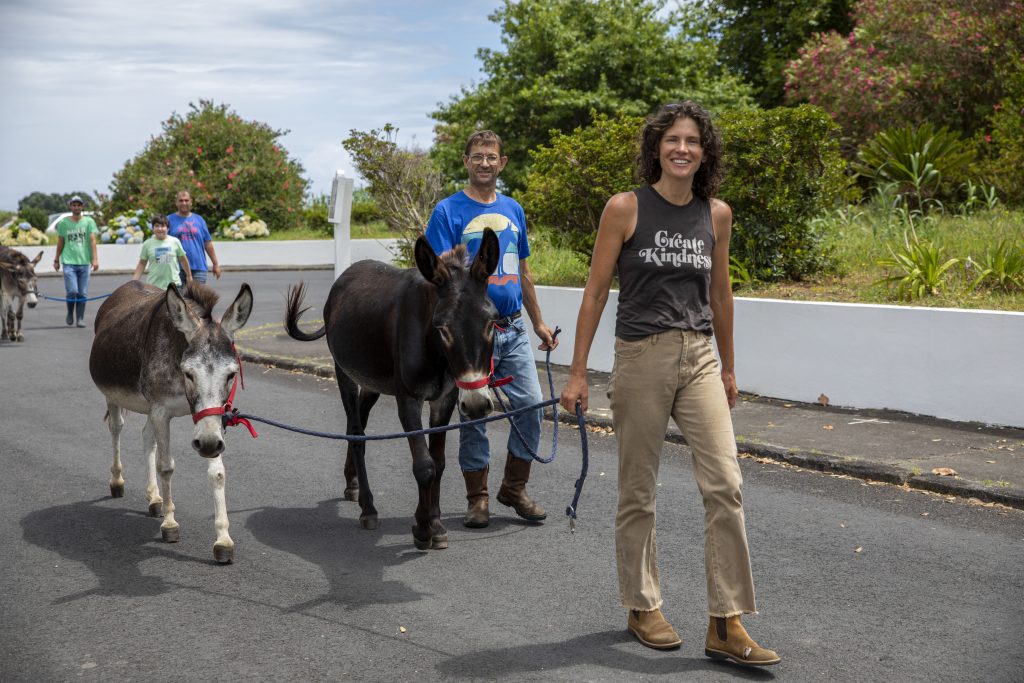
The idea of creating a “donkey sanctuary” at her property in Água D’Alto, municipality of Vila Franca do Campo, the “Donkeys, and Friends,” arose from a friendship with a local who is now part of the project and whose father owned a donkey.
One year after the beginning of this project, which has seven animals, the zoologist highlights the “full interaction with humans, since the animals are very docile.” She rejects and condemns the relations with the animals as they occurred in the past: “Whoever wants to ride the animals should carry them first, and then share the experience.”
Bethany Joy recalls that these donkeys made “great contributions” to farming by carrying supplies and the resulting crops on the island when their owners would ride them.
Now, in her project, there are ” tens of clients a week, both in Caloura and Água D’Alto,” who, besides taking the donkeys for a ride, can socialize with the animals on the property, taking care of their hygiene and feeding, grooming or bathing them.
Their clients, whose only standard profile is the passion for nature and animals, are foreigners, Portuguese from out of the region, or Azoreans, of different ages. They have ranged from a 5-year-old child to an older man of 93 interacting with the donkeys.
Visitors sign up for the tours online (on the Airbnb platform), making sure to “reconcile animal welfare and the number of people who join the activity,” with a limitation on the number of daily tours.
Besides the walks, some people have chosen to have picnics or practice yoga with their animals at “Donkeys and friends.”
The project also has a social and inclusive aspect, promoting the interaction of disabled people with the donkeys, which are presented exceptionally cleanly.
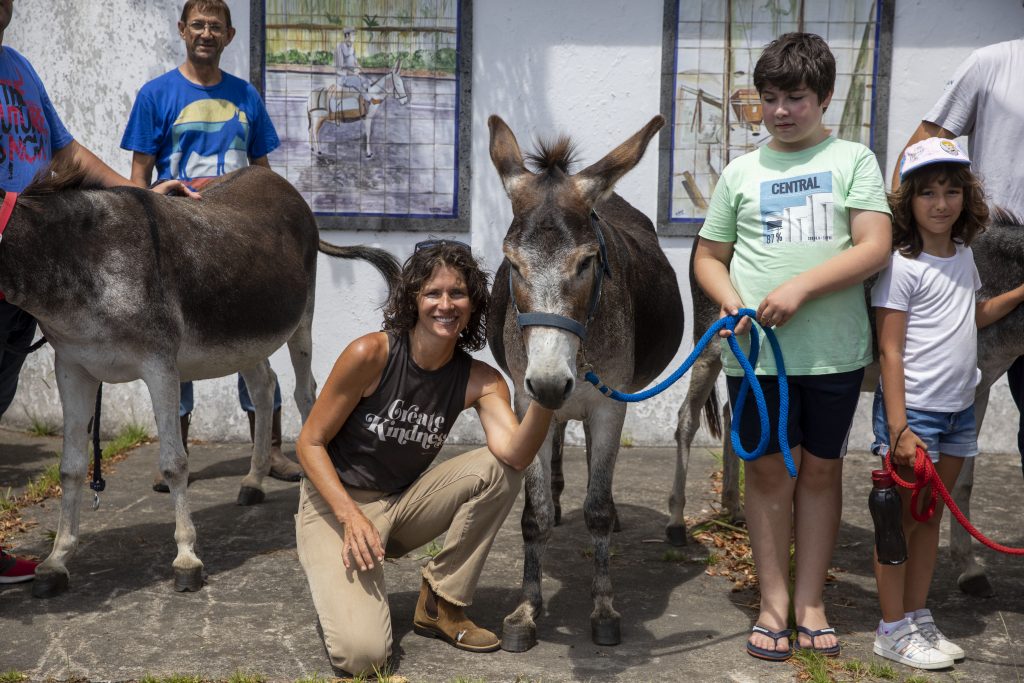
The American zoologist is “focused on clients who love animals and nature, in a perspective of interaction and based on sustainable practices,” considering that you get “more connected when you treat animals equally.”
Bethany Joy, who graduated from James Cook University and has also lived in Australia, has the ambition to expand, creating more spaces on the island of São Miguel, dispersed, with more animals, integrating into the communities, and creating local jobs, in a contribution to settled populations.
At the farm, there are two “stars” among the donkeys: Joaquim Horta, who was born on the property, and Eduardo, who is the most undisciplined and docile animal in the place.
The donkey ride is an alternative for more active tourism in São Miguel, where there are activities such as whale watching, canoeing, more extreme sports, horseback riding, trails, or boat trips.
On the island, in the 19th century, by British initiative dedicated to the so-called orange cycle, donkey tours were promoted to various locations, such as Furnas and Sete Cidades.
Artigo em Português
Americana cria santuário de burros que é atração nos Açores
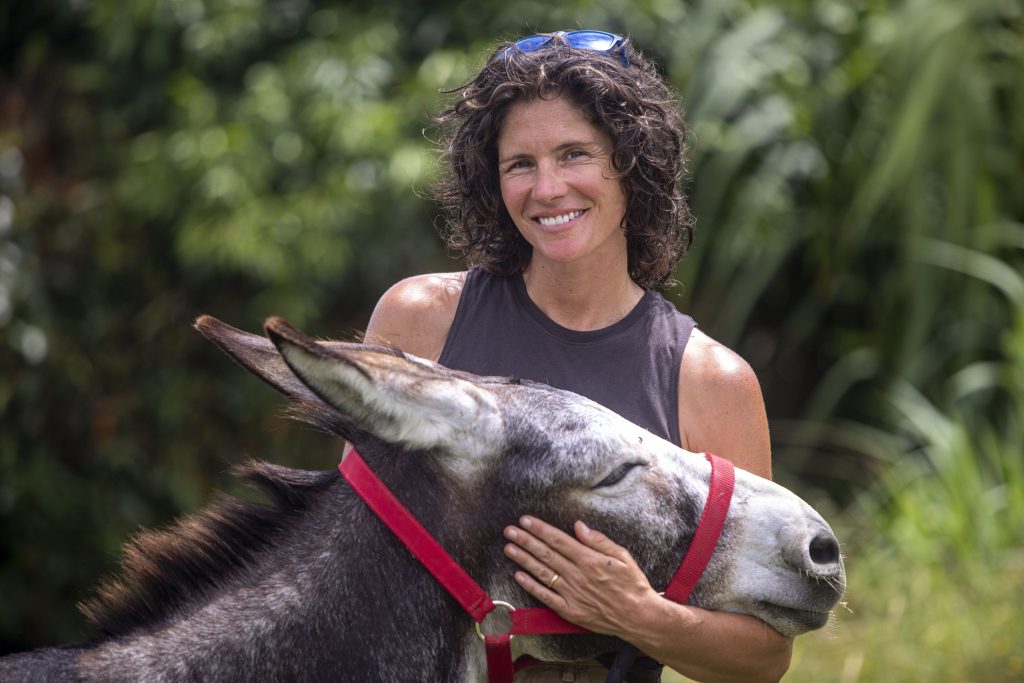
A zoóloga norte-americana Bethany Joy poderia ter-se fixado em qualquer espaço do globo, mas após ‘tocar’ os Açores quatro vezes, a velejar, decidiu que tinha de “viver no paraíso”, promovendo hoje passeios com burros para turistas.
Natural do Missouri, Bethany Joy esteve 15 anos a navegar pelo globo a trabalhar em projetos de conservação animal e cruzou o Atlântico muitas vezes. Parou nos Açores em quatro ocasiões e “todas as vezes” gerava a “nota mental de que iria voltar e viver no paraíso”, no arquipélago, na ilha de São Miguel.
A intenção materializou-se depois do seu casamento com um italiano, tendo ambos fixado residência nos Açores, narra a zoóloga em declarações à Lusa, à sombra do arvoredo, com os seus animais, na Caloura (concelho de Lagoa), enquanto os burros se alimentam de ervas e captam as atenções dos curiosos que passam e tentam alguma interação, sobretudo crianças.
Tendo adquirido uma propriedade em Água D’Alto, com vista privilegiada sobre o ilhéu de Vila Franca do Campo – uma cratera vulcânica, classificada, onde é possível nadar – a norte-americana leva os turistas a conhecer localidades da ilha de São Miguel na companhia dos seus burros, sem que estes sejam montados.
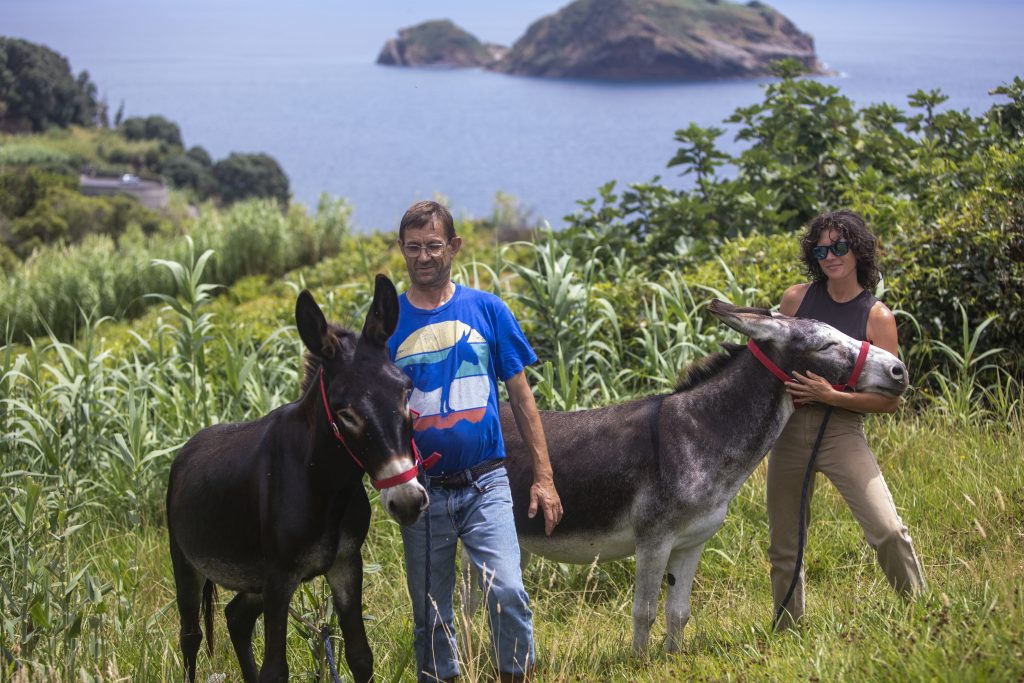
Os animais podem ser vistos ainda pelas ruas da zona balnear e classificada da Caloura, na vila de Água de Pau, para deslumbramento dos visitantes, que também podem conhecer a exploração onde moram os burros, “alguns dos quais recuperados, depois de maltratados”.
A ideia de criar um “santuário para burros”, na sua propriedade, em Água D’Alto, concelho de Vila Franca do Campo, a “Donkeys and friends”, surgiu na sequência de uma amizade com um local, que hoje integra o projeto e cujo pai possuía um burro.
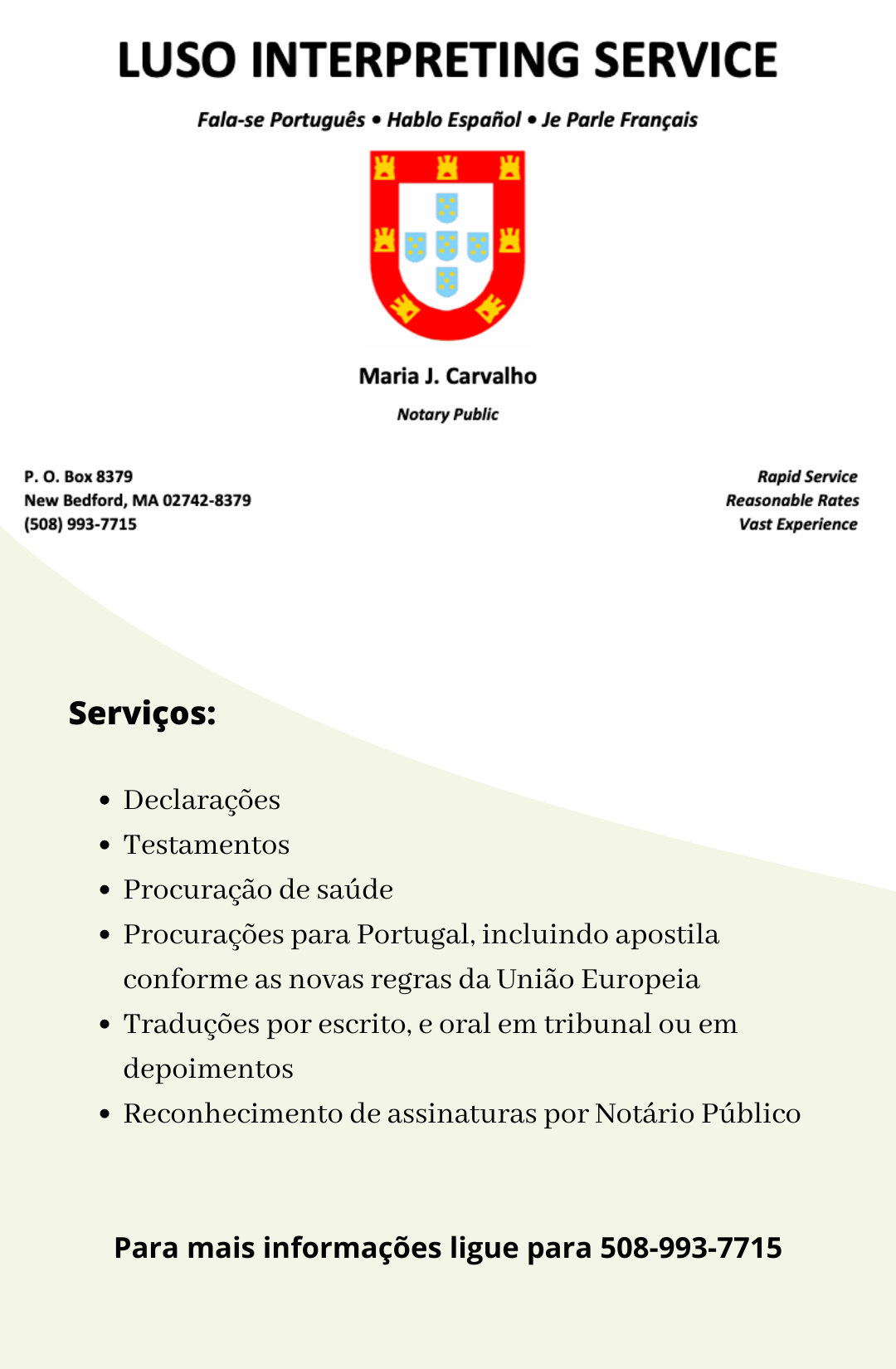
Um ano depois do início do projeto, que tem sete animais, a zoóloga destaca a “plena interação com os humanos, uma vez que os animais são muito dóceis”. Rejeita e condena as relações com os animais como ocorriam no passado: “Quem quiser montar os animais que os carregue primeiro e depois partilhe a experiência.”
Bethany Joy recorda que estes burros deram “grandes contributos” nas explorações agrícolas, carregando material e o resultado das culturas na ilha, altura em que eram montados pelos seus proprietários.
Agora, no seu projeto, são “dezenas os clientes por semana, tanto na Caloura como em Água D’Alto”, que além de passearem com os burros podem confraternizar com os animais na propriedade, tratando da sua higiene e alimentação, escovando-lhes o pelo ou dando-lhes banho.
Os seus clientes, que como perfil comum apenas têm a paixão pela natureza e pelos animais, são estrangeiros, portugueses de fora da região ou açorianos, de diferentes idades. Já houve desde uma criança de 05 anos a um idoso de 93 a interagir com os burros.
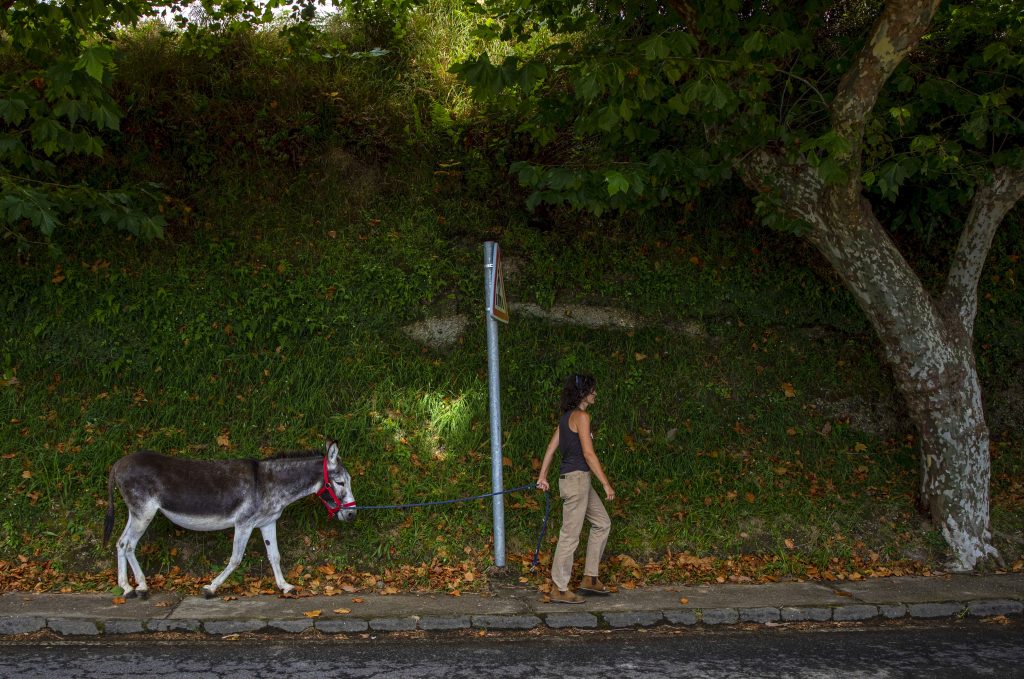
Os visitantes inscrevem-se nos passeios via ‘online’ (na plataforma Airbnb), havendo o cuidado de “conciliar o bem-estar animal e o número de pessoas que aderem à atividade”, com a limitação do número de circuitos diários.
Além dos passeios, há quem tenha optado por realizar piqueniques ou praticar ioga na presença dos animais na “Donkeys and friends”.
O projeto contempla também uma vertente social e de inclusão, promovendo a interação de pessoas portadoras de deficiência com os burros, que são apresentados extremamente limpos.
A zoóloga norte-americana está “focada em clientes que amem os animais e a natureza, numa perspetiva de interação e com base em práticas sustentáveis”, considerando que se fica “mais conectado quando se trata os animais por igual”.
Bethany Joy, formada pela James Cook University e que viveu também na Austrália, tem como ambição expandir-se, criando mais espaços na ilha de São Miguel, dispersos, com mais animais, integrando-se nas comunidades e criando postos de trabalho locais, num contributo para fixar populações.
Na exploração existem entre os seus burros duas “estrelas”, o Joaquim Horta, que já nasceu na propriedade, e o Eduardo, que é o animal mais indisciplinado e dócil do espaço.
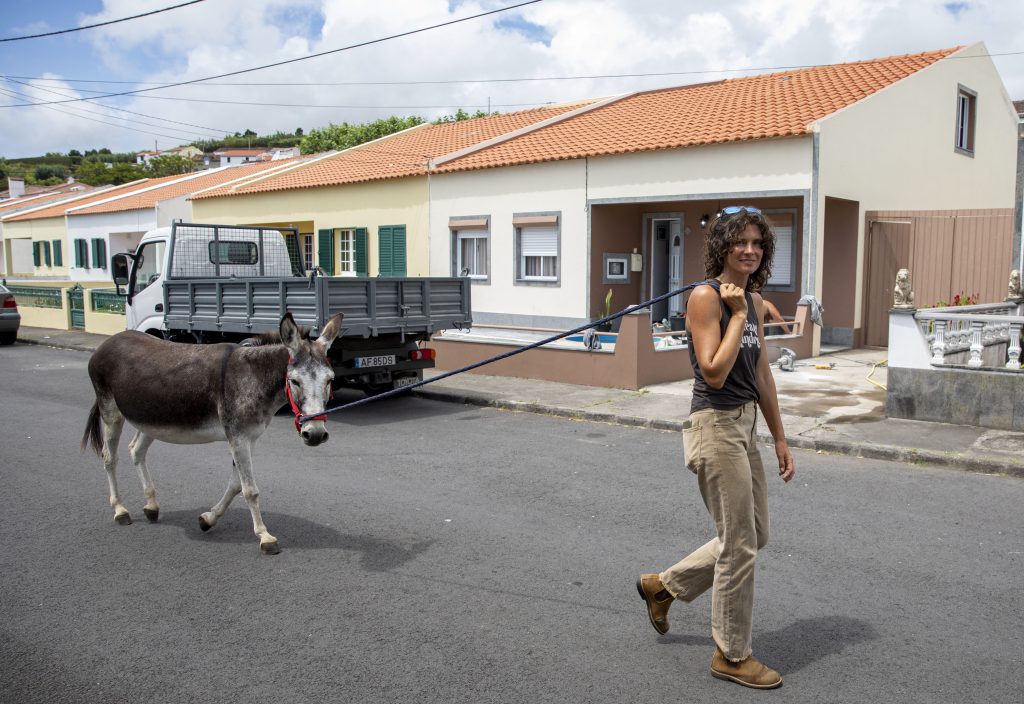
O passeio com os burros apresenta-se como uma opção no âmbito de um turismo mais ativo em São Miguel, onde existem atividades como a observação de cetáceos, canoagem, desportos mais radicais, hipismo, trilhos ou passeios de barco.
Na ilha, no século XIX, por iniciativa de ingleses que se dedicavam ao denominado ciclo da laranja, eram promovidos passeios turísticos com burros a várias localidades, como as Furnas e as Sete Cidades.



